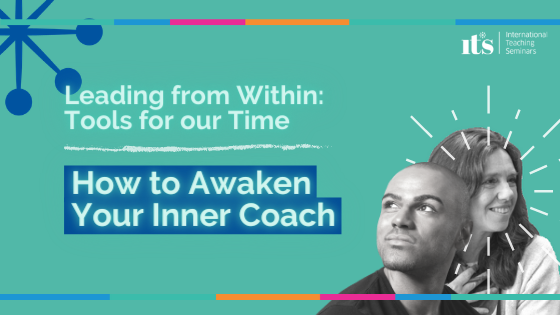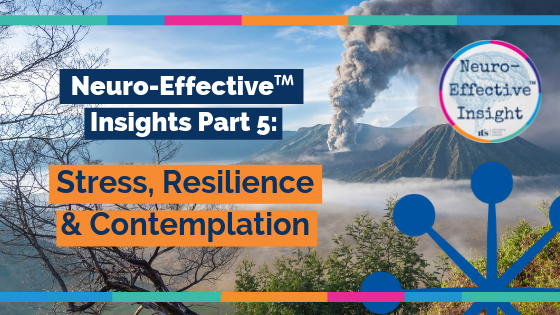Being in charge of your life means being in charge of yourself.
You’ve probably encountered people who know vast amounts about certain subjects and display great professional expertise, but who seem all over the place as people. Despite their knowledge, they lack that personal mastery.
Personal mastery is the royal road to joy and fulfilment. It’s a set of strategies and tools which help you live and work at your best. You can’t buy it and you won’t find it somewhere out there in the world. Its source is within you and if you know how to pay attention to these inner signals they can guide you to make better decisions. As a result you’ll be better able to lead yourself. That’s why I talk about ‘Leading from Within’.
In this time of global disruption – more than at any time in our life, I suspect – this is a skill worth learning. Knowing how to develop personal mastery and put it to use is frequently the difference that makes the difference when we’re talking about how much personal fulfilment or professional success we can enjoy.
In the words of business guru Peter Senge:
Implicit in the practice of personal mastery is another dimension of
the mind, the subconscious. It is through the subconscious that all
of us deal with complexity. What distinguishes people with high
levels of personal mastery is that they have developed a higher
level of rapport between their normal awareness and their
subconscious. What most of us take for granted and exploit
haphazardly, they approach as a discipline.
Peter M. Senge, The Fifth Discipline
Senge goes on to enumerate why it’s worth developing this skill:
- Everyday conscious thinking is not enough to handle the complexity of our experience.
- All of us deal with complexity through the subconscious.
- Some people are smart enough to regard their subconscious as a valuable personal and professional resource.
- It is possible to create a higher level of rapport between your normal awareness and your subconscious.
- People who commit to building such a relationship achieve more – and achieve it more easily – than people who don’t.
There are practical skills you can learn to raise your awareness in this way and cultivate what I call your ‘Inner Coach.’
There are certain basic principles which help create and sustain such a productive internal relationship between you and yourself. In particular:
- there are certain assumptions that help
- there are certain states of mind and body which make it easier
- there are ways of approaching and conversing with yourself which are much more productive than others.
These are the keys to success. You can use them to become more effective in any area of your life. And once you learn how, you can do this for the rest of your life.
So what do I mean by ‘unconscious’?
Your unconscious is as much part of you as your eyes, ears or fingers. I’m including everything about you that you don’t have regular, immediate access to.
This includes much about the workings of your body as well as your mind. It also includes your ability to surprise yourself and others – as when you wonder, ‘Now where did that come from?’
Trusting your unconscious is about trusting yourself. Working with your unconscious is about working with yourself. It’s the most natural way of being fully integrated in mind, body and spirit. It’s discovering that within you there’s a source of information, judgement and wisdom.
You will find this wisdom within through a process of dynamic inquiry which I call ‘Inner Coaching’ and it will give you more riches than you ever imagined possible.
The Benefits of Inner Coaching
Cultivating an Inner Coaching relationship with yourself will give you:
- Much greater understanding about what’s going on inside you.
- Greater access to your own resources – and a new way to tap into them.
- An increased ability to self-monitor and self-manage.
- An ability to make wiser choices.
- More effective strategies for interacting with others because you understand more about how people tick.
The skills that you practice initially through your Inner Coaching become increasingly rapid and automatic. And it can all begin naturally, easily and immediately from the very first moment you begin to work with yourself in this way.
Inner Coaching: A Tool for Life
One of the most exciting and rewarding skills we can learn in life is working with our unconscious.
In my experience when you ‘check in’ with yourself regularly the benefits are many and varied. I find people more able to tap into their own creativity. Often they also recover an ability to just wonder again. When we’re willing to learn from what I sometimes call the Wisdom Within we open ourselves up to a truly remarkable dimension of our own potential. One of the benefits I have seen many times is that people develop a confident humility.
Building this kind of rapport with yourself and learning how to make it a regular, automatic and disciplined part of life, will allow you to tap into your own potential. As you do so you will also feel more at ease in yourself.
The dimension of mind we’re concerned with here goes by many names, and figures in many different kinds of effective work. I choose to refer to it as the unconscious or sometimes the other-than-conscious because this describes quite literally what we’re talking about: those mind-body processes which take place outside our conscious awareness.
What’s on offer is a way of engaging systematically with your own unconscious potential. Only when you know how to do this can you develop personal mastery.
‘Til then you might want to ponder these three questions:
- What are your beliefs about the unconscious?
- What sort of relationship do you have with your own unconscious?
- What would be different if you could tap into more of your own creativity?
Only you can reach your full potential. Even if you’re unsure of your capabilities we can help you find your focus.
Improve your life by joining me on the ‘Awaken Your Inner Coach’ workshop and take the steps to becoming your own leader.
This article is written by Ian McDermott and draws on the book Your Inner Coach by Ian McDermott & Wendy Jago.





It is confusing to discuss subconscious and unconscious. I feel it would be beneficial to stick with unconscious which is a much more Jungian concept than subconscious. In any case the prefix “sub” implies inferior whereas in fact the conscious and the unconscious should work as partners.